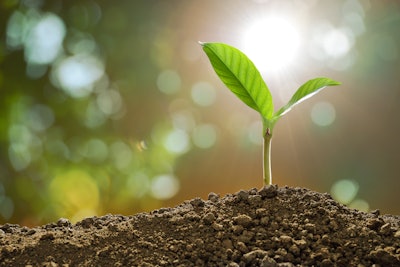
Maintaining a sustainable food chain both upstream and down comes with a host of challenges and opportunities. On one hand, doing so protects people, product and plant, reduces waste, encourages a green economy and ensures the freshest of foods are transported in the safest, most efficient manner possible. Plus, it’s just good business practice.
On the other hand though, an aging infrastructure, a rise in grocery e-commerce and an influx in globalized sourcing continue to stress today’s cold chains.
So, how can companies continue to keep sustainability top of mind amid a global pandemic and continuous supply chain disruptions?
In Food Logistics’ June 2021 issue, editor-in-chief Marina Mayer talks with several industry experts about why sustainable food chains matter and how companies can obtain the supply chain visibility needed to effectively maintain a sustainable food chain.
Here’s an interview with Sarah Watt, senior director, analyst, Gartner Inc., and Susan Boylan, director, analyst, Gartner Inc., with excerpts publishing in Food Logistics’ June 2021 issue. [CLICK HERE to read the article in full].
Food Logistics: From your vantage point, what are some of the main sustainability-focused challenges today’s cold food chains face?
Sarah Watt: The main challenge for cold chain from a sustainability perspective is to reduce greenhouse gas emissions (and energy consumption), while still maintaining product quality and ensure good service. The second challenge is to reduce food waste in the field and at the consumer end.
Especially with consumer trends toward buying more locally grown food and agriculture products, the cold chain needs to become more distributed. Not always in this chain can the cold chain be sustainably sourced, unless there are local laws or incentives that will require it. In this sense food safety will compete with sustainably sourced cold food logistics, especially for microgrowers and food producers.
Food Logistics: To piggy-back on this, what are some of the solutions, efforts or initiatives in place to promote sustainable food chains and mitigate waste, etc.?
Susan Boylan:
Management solutions. Organizations can review their inventory levels to ensure they are holding viable levels of inventory and are not stretching or overusing capacity which will increase energy consumption. Regular inventory rotation and quality checks will ensure food products are not wasted or subject to temperature exposure damage resulting in food products needing to be wasted and disposed of.
Application of technology. Machine learning is being used to improve bar code capture to reduce food waste. IoT, AI and blockchain can identify potential sources of contamination and make recalls easier to manage. Mobile apps combined with blockchain can help smallholders record their sales to corporations, improving the odds that the smallholder can get access to better, more affordable credit. Big data and satellite mapping can identify how corporations are impacting the world’s forests.
Initiatives to develop and manage a sustainable food value chain has to include the sustainable economics for food producers, the ability to map the food production life cycle with societal goals, like maintaining biodiversity, water conservation and reduce ground water pollution, as well as the environmentally neutral impact of the food life cycle, including the reduction of food waste. The sustainable food value chain is enabled to the fair pricing and cost allocation across the value chain, with retailers paying producers according to production cost, especially when this production is done in a sustainable way.
Food Logistics: Sustainability still matters, even in a global pandemic. Why is this? (Think ESG efforts, renewable energy/packaging, modernization, automation and more).
Watt: Our research shows that sustainability still matters. We surveyed senior executives whose organizations had sustainability programs in place. We asked how COVID-19 impacted the prioritization of environmental and social sustainability efforts. We found that 49% stated the focus on environmental sustainability has increased and 70% state that the emphasis on social sustainability has increased. In some organizations there is a recognition that macro challenges such as climate change has the potential to be disruptive, but it also represents an opportunity for innovation and releasing new products to market.
We have also seen sentiment amongst investors change, with some focusing on stakeholder capitalism and asking organizations to make climate disclosures (e.g. Taskforce on Climate Related Financial Disclosures)
I would argue that sustainability has grown immensely after COVID because people stay at home and they have more concern about healthier living, awareness of surroundings, green spaces to walk and exercise, how social health is developing. Environmental sustainability is an outcome from that. Large organizations like the World Economic Forum (WEF) had launched the Great Reset, working on the sustainable and carbon neutral recovery of industry sectors and global economies. The circularity of life cycles of products, buildings, even cities have been openly discussed in regional, national and local government and industry bodies. Logistics and supply chain have been boosted through the rise of e-commerce, but this supply chain has started to become more sustainable because of reporting concerns and carbon emissions through fuel etc.
Food Logistics: How does the Biden Administration’s Climate Change Action Plan and re-joining of the Paris Agreement impact the current and future status of sustainable food chains?
Watt: We are starting to see more emphasis on sustainable agricultural practices. We know that emissions are generated from food production but also land use change, such as deforestation. Reducing emissions from agriculture can be challenging as it means engaging with diverse stakeholder from large producers to small holder farmers. The sustainability solutions will vary by market, scale of farming operation and local conditions.
The Biden Administration’s Executive order recognizes the global challenge of a changing climate, building this into both domestic and foreign policy. The administration is looking at take-action across all agencies, including agriculture. Although we don’t know the specifics for sustainable food chains, this could include incentives or taxation mechanisms based on farming techniques.
Many of the agriculture products will be exported, which means that those exports have to comply to global sustainability measures, especially in the EU.
Food Logistics: What should companies in the cold food and beverage space do to achieve sustainable food chains? Where do they start if they haven’t done so already?
Boylan: Companies in agricultural value chains should embrace lean initiatives with their service providers to ensure sustainable outcomes, focused on waste reduction and effective resource utilization.
Food Logistics: What kinds of technologies/solutions (i.e., Internet of Things, automation, etc.) is your company investing in and why?
Watt: There are three types of solutions sets that we can apply to create a sustainable farming ecosystem:
Environmental solutions. Environmental solutions are focused on how we farm, but using, for example, regenerative farming techniques which focus on soil quality though cover crops, limiting soil disturbance, focusing on crop diversity to improve soil quality and in some instancing integrating grazing livestock into this system.
Technology solutions. The technology solutions vary. From mobile phone applications that can help smallholder farmers identify crop disease and actions to take, to high tech solutions such as vertical farming and precision agriculture.
Engineering solutions. There are also engineering solutions that can improve crop production and harvesting. This includes the application of robotics and automation to harvest some crops.
Food Logistics: What does the future of sustainable food chains look like? Any risks/rewards?
Watt: Our food chains have the potential to be revolutionized. We are seeing changes in farming practices, such as applying regenerative agriculture principles. We are also seeing investment in farming systems, such as vertical farming. With the localization of food chains in urban corridors, more focus towards organic and biodiverse agriculture, sustainable food chains will be more diverse, distributed and managed through new constituents, like roof top real estate owners, housing cooperatives and new food production companies that are partially 3D print different food sources.
In addition to these changes, companies are investing in seed development or exploring heritage seed to advance crops which are more resilient to a changing climate. Technology will also play a major role in both crop production and livestock management, from precision farming to enabling enhanced value chain traceability.
At a macro level, the risk is that through this transition to a more sustainable food chain, that we still leave communities behind. That both developing countries and those in low-income communities will still face food poverty – a lack of equity when accessing food.







![Adobe Stock 280800711 [converted]](https://img.foodlogistics.com/files/base/acbm/fl/image/2021/08/AdobeStock_280800711__Converted_.611e898daa123.png?auto=format%2Ccompress&fit=crop&h=167&q=70&rect=0%2C53%2C900%2C507&w=250)









